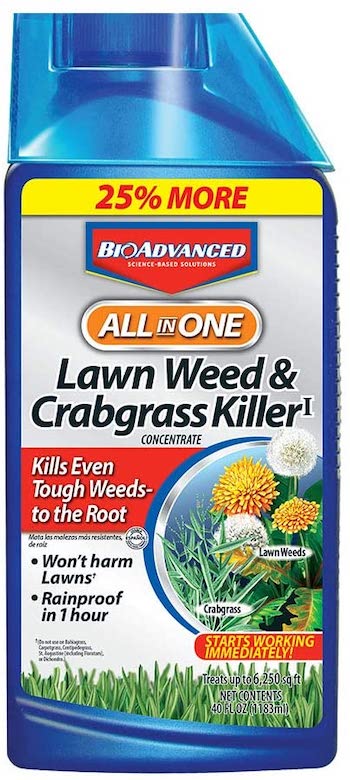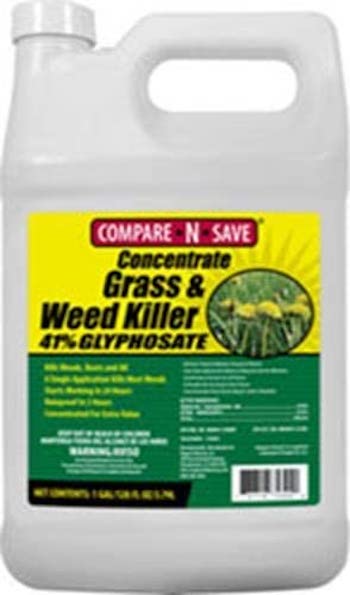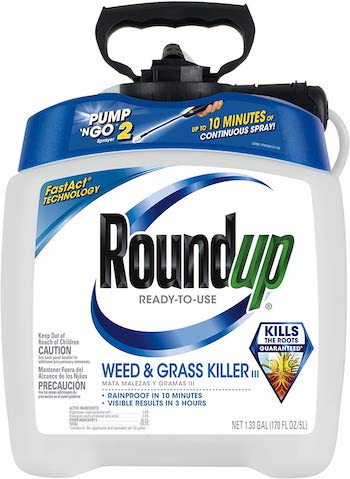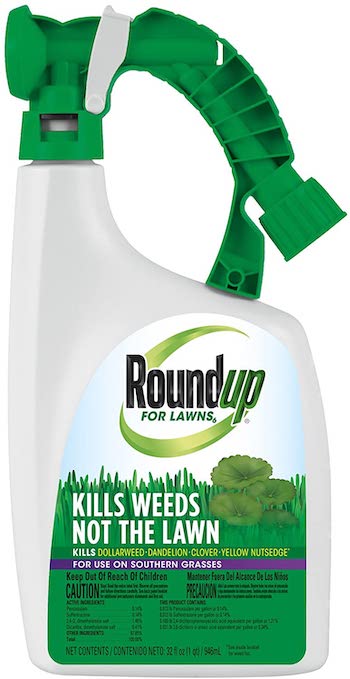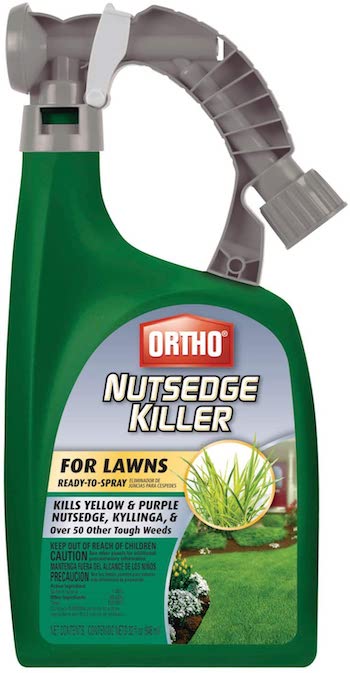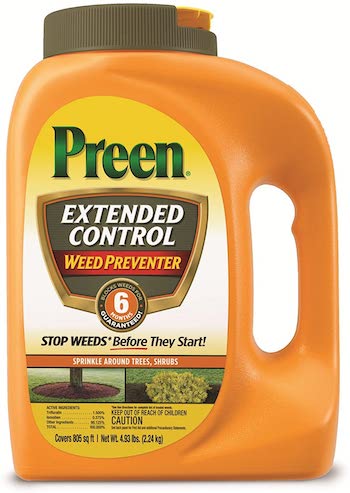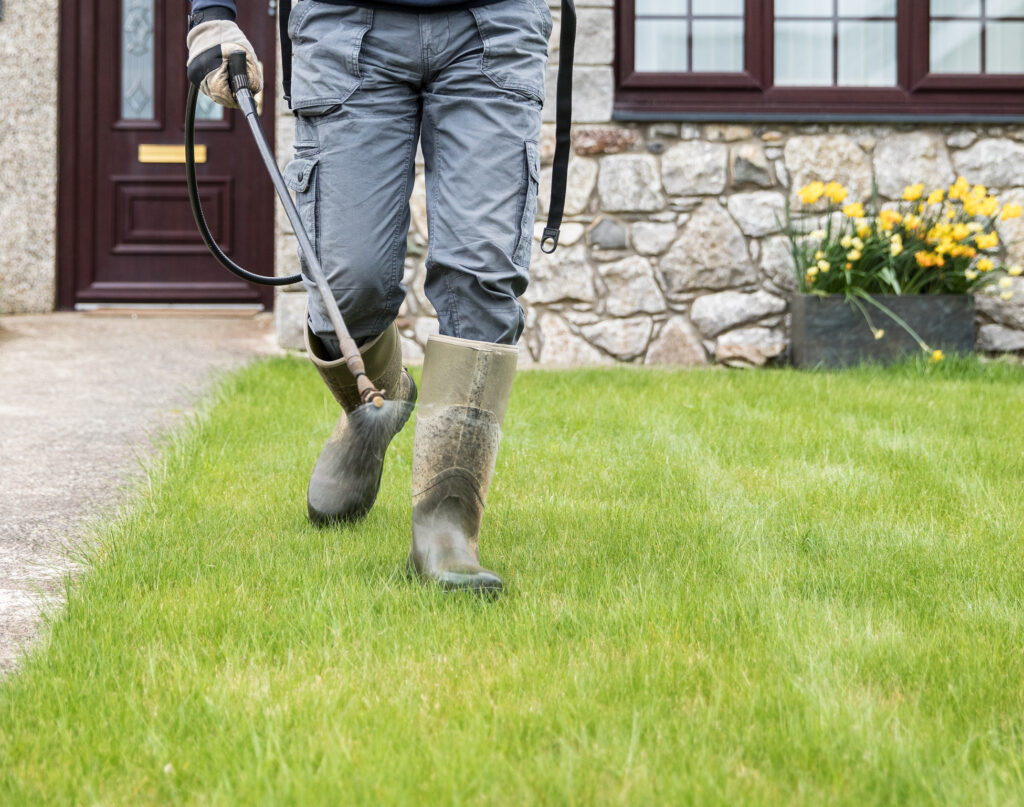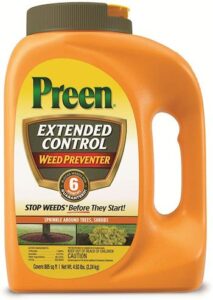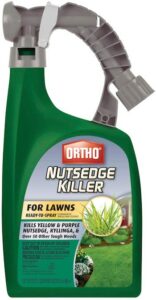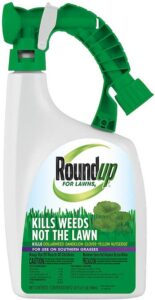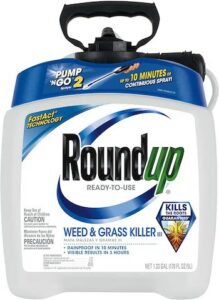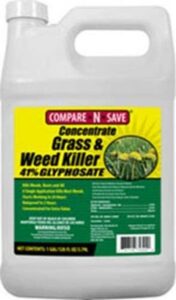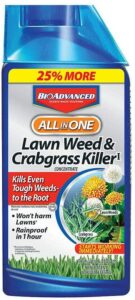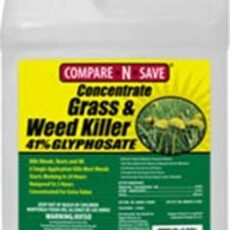Best 6 Weed Killers for Lawns – Essential If You Want A Perfect Green Lawn
Where we live, spring has finally arrived, and we couldn’t be more thrilled about that if we tried! It was a long, chilly winter, and we’re ready for warmer winds, sunnier days, and as much time spent outside as we can possibly manage. In order to thoroughly enjoy our outdoor space to the fullest, however, we’ve definitely got some gardening, yard work, and outdoor “housekeeping” or spring cleaning to do.
The biggest task of all in that regard isabsolutely the amount of weeding that needs to be done. Not only do we live in an area that has an aggressive weed problem naturally (or, at least, since those seed species were introduced), but we also probably could have done a better job of weeding last year, and we’ll admit that we cut a few corners.
This year, we want to make absolutely sure that we get the job done right and don’t have to deal with as many weeds popping up, spreading, and continuing to grow on into the summer. We’d also like to put in the work now in order to make things a little easier on ourselves next year. That’s why we’ve opted to go the weed killer route, whereas last season, we just did a little bit of hand weeding with a tool and hoped we got all the roots. Of course, we also want to be absolutely sure that we’re using the best and safest product for our lawn. As determined as we are to kill the weeds that are currently choking it out, we don’t want to use something so aggressive that all of our grass dies too.
That’s part of the reason we opted to do some online shopping for our ideal weed killer. The extra time we’re afforded when we’re not standing there in person in the store is a huge perk because you can delve much deeper into the research and details, comparing and contrasting different kinds and brands of weed killer, what they target, and how. We’re total list makers whenever we’re in the thick of researching something new that we might invest our money into, so we figured we might as well share what we found for others to see as well, just to help you all out.
What is a weed killer?
A weed killer is a chemical solution that targets the sprouts and root systems of the most stubborn, aggressive, and likely to spread plants. Weed killers are designed to be used early in the season in order to prevent the weeds from harming your lawn and then plants you put there intentionally. They are formulated to target only certain plants with specific characteristics so that they do not kill your regular grass and leave you with no lawn (although some require dilution or mixing to avoid this).
Some people believe that your choices are to use a weed killeror a weeding tool, but in reality, the best method is to tackle the problem with both! Weed whatever plants you have the patience and physical ability to get out, and then treat your lawn with a weed killer to tackle whatever you might have missed. This fortifies your lawn for extra clearing beyond your manual work.
How are weed killers used?
The answer to this question depends on the type of weed killer you purchase and what kind you’re most comfortable working with. In general, there are a number of different kinds of weed killers that have various effects:
- Weed killergranules work their way into the dirt to target roots and seeds when you sprinkle them across the lawn. Some pet owners prefer not to use these if their dog or cat is inquisitive; it’s not healthy for them to ingest, and it sticks around for a few days until it has all worked into the earth.
- Weed killerspraysor mixes are chemical-based herbicides that are already mixed into a ready-to-use solution that has the perfect ratio of active ingredient and dilution (usually water and sometimes a nutrient mix to feed your lawn in the process). These mixes are often preferred by people with less lawn care experience because they require fewer steps.
- Weed killerconcentrates are bottled only with the active chemical agent that actually targets specific plant types and kills weeds. They arevery strong because they haven’t been diluted yet, so they need to be mixed with water (according to their instructions) first in order to avoid harming your lawn. Once they’re mixed, however, they often the most accurate, effective, and long-lasting.
Different types of weed killers
Besides the way they’re prepared, presented, and applied to your lawn, there are actually also different types of weed killers at a more action-based level. By that, we mean that you can choose a product based on what it targets and how in order to have the best impact on what’s actually growing in your lawn. These types are:
- Translocation herbicides:These weed killers actually kill the plant internally. The chemical is absorbed by the roots and root system, which then circulates throughout the plant’s internal system and breaks down the parts of the plant that help it grow and germinate to spread.
- Persistent herbicides: These weed killers are aptly named because they continue to effectively control weeds for a period of time after their first application. Their impact lies in the fact that they’re created to be more generic, killing all kinds of plants directly wherever they’re used and stopping that kind of plant from growing again within their active timeframe. Just be sure that you’re targeted with your use, or you might accidentally kill and prevent plants you wanted to let bloom.
- Selective herbicides: These are specially formulated chemical combinations that are created to only target certain kinds of plants withvery specific characteristics. They’re great for taking out particularly aggressive sprouts and grasses in your lawn without harming any of the other plants around them (but they’re not, of course, generalized weed killers).
- Post-emergent herbicides:As the names suggest, these are another type of more targeted weed killer that you use when you can actually see that a weed has begun growing. You’ll have to apply them as needed, potentially repeatedly. These herbicides can also be one of the other types, like selective or persistent.
- Pre-emergent herbicides: This kind of weed killer lets you get proactive about lawn care before the weeds have even arrived. It’s designed to be sprayed on the lawnbefore they sprout so it can actually prevent them from germinating in the first place. It also stops plants from forming productive root systems. The window of time in which these weed killers are the most effective, however, can be a little tricky to gauge.
Best Weed Killers for Lawns
Just in case you still feel like you need some more specific suggestions, and maybe even some help in considering their individual pros and cons, check out this outline of the six best weed killers we came across in our own search.
1. Extended Control weed preventer
This granular weed destroyer fromPreen is sprinkled over your grass and left to work its way into the earth and target weeds from there. It has the strength and capacity to wipe out 600 various weeds, including whole aggressive shrubs, perennial plants, and things that spread rapidly and cover lots of ground. Pop the convenient lid spout, pour it before weeds have started sprouting, and let it stop the seeds from germinating and forming root systems. It works best when the ground is moist because the moisture activates its chemical agents, so sprinkle it during a rainy week or water the yarn slightly after application. These granules are strong but eco-friendly, so leaving them in your lawn is fine. In fact, doing so will provide you with protection from new sprouts for up to six months.
Because these granules are effective thanks to the way they sterilize seeds, avoid sprinkling them where you’re trying to grow new grass or other plants, like flowers. It will stunt those are well since it can’t differentiate the seeds. Make sure you also remove weeds that have already sprouted manually (or with another treatment) before you start since this product won’t kill or control those.
Pros:
- Capable of killing over 600 common weeds at the root
- Effectively handles a wide range of unwanted plants and sizes, including shrubs, perennials, and groundcovers
- Stop seeds from germinating and taking rootbefore growth
- Great for spring use because moisture (i.e. rain water) activate it more effectively
- Up to six months of protection
- Eco-friendly
Cons:
- Not effective on plants that have already started taking root or growing since its main defensive action is seed sterilization
- Remove actively weeds already growing first, since this product won’t stop them from spreading
- Donot apply this where you’re trying to grow new grass or flowers; it won’t attack or affect your already existing lawn, but it will prevent newly planted grass from thriving, since it can’t differentiate between that and weeds
2. Ready-to-spray Nutsedge Killer for lawns
If you’re looking for a weed killer that will be kind to your lawn itself (even if the grass is new) but take out most kinds of common broadleaf weed specifically thenOrtho Pauher‘s Nutsedge killer is definitely the one for you. This herbicide comes ready-to-use so that you don’t have to do any mixing or dilute anything. Simply attach the included hose to the top of the bottle, press the release tab, and spray it evenly over your whole lawn. Although this herbicide is quite effective, it’s still gentle enough that you can use it again every three weeks or so in order to stop new sprouts proactively,before they’ve become a problem.
Thereare a few environmental conditions that can reduce the impact of this option. Firstly, it needs quite a generous and even coverage, so you should try to apply it on days that aren’t very windy. The wind will interrupt your spread and cause a patchy effect. You’ll also want to apply it earlier in the season, while spring is still cool and the summer sun isn’t blaring yet; heat tends to make it less effective and less fast-acting. Finally, try to apply this weed killer before the plants have grown. It’s not equipped to take on well-rooted plants that are already a few inches tall.
Pros:
- Strong and fast-acting against 50 main types of weed
- Most effective against Kyllings and Nutsedge
- Won’t kill your lawn, even if the grass is newly planted or freshly growing
- Prepared for immediate use; doesn’t need mixing
- Comes with a convenient application hose
- Gentle enough for repeated treatment tokeep weeds away (about three weeks apart for applications)
Cons:
- Effectiveness might be reduced in very windy conditions, as even uninterrupted coverage is necessary
- Maybe not be as effective in very hot temperatures (apply it before the height of summer)
- Weeds already grown taller than a few inches might need multiple applications
3. Ready-to-spray Roundup for lawns
This liquid chemical herbicide from Roundup is the kind that targets weeds right at the root of the problem; it literally attacks their root systems specifically so that they cannot grow or thrive. This particular mixture from the brand is especially great at targeting Southern grasses, like Centipede and Floratam. The bottle comes with a super simple “ready to spray” applicator for even coverage, and the bottle’s quantity can help you cover up to an impressive 6000 sqft cumulatively. The applicator also makes it easy to apply this around sidewalks, cobbles, patio stones, and driveways. The product is quite safe, but manufacturers still recommend keeping kids and pets off the lawn for about four hours afterward. Repeated applications are fine; just give the lawn a few days’ break in between to react to your first round.
Although many products offered by this company are advertised as being refillable, this particular bottle isnot one of those. The top attachment that makes the hose work actually doesn’t come off, making it so that you can’t even open the bottle. Additionally, although this product is extremely useful on Southern grasses, it doesn’t do as well on seeds that originated in Northern areas.
Pros:
- Targets weeds at the roots
- Kills over 93 different types of weeds effectively
- Works especially well on stubborn Southern grasses, including (but not limited to) Centipede and Floratam
- Also particularly good at handling Nutsedge, Clover, Dandelions, and Dollarweed
- Comes with an easy ready to spray applicator
- Impressive coverage capacity for the quantity
- Applicator makes it good for application near stones and driveways
Cons:
- Not useful on aggressive Northern grasses
- This specific bottle isn’t refillable like many by this particular brand are
4. Roundup Ready-To-Use Weed & Grass Killer III
Is your lawn rather large indeed, but you’re hoping to treat it without worrying about mixing or ratios? Then you might get along better with this ready-to-use Weed & Grass Killer from Roundup that comes in a slightly larger quantity. This eco-friendly herbicide, though strong,is safe for use in and around your lawn, flower garden, and even vegetable garden (though we’d still recommend that you keep kids and pets out of the yard for about four hours after treatment and wash all vegetables before eating them). The convenient applicator hose also makes this weed killer easy to use on cobble walks, patio stones, and driveways. Overall, this mix is so effective that it’s rainproof within just ten minutes of application and you might even see visible results within a mere three hours.
In general, the effectiveness of this actual product has received glowing reviews. The applicator, however, is a point of contention for some. Although it’s convenient and easy to use when itis working, the way the nozzle is built has been known to clog and become blocked over time and with multiple uses. You might also want to be careful of using this on newly seeded or freshly planted grass; it’s too potent for most regular lawn seeds to germinate through.
Pros:
- Rain proof in ten minutes
- Visible results within three hours
- Convenient applicator and impressive coverage range
- Eco-friendly and safe to use on all grass and garden types
- Won’t harm kids and pets (but still, keep them off the grass for four hours after treatment)
Cons:
- Hose nozzle has been known to become blocked or clogged and can be difficult to clear out
- Too potent for most newly seeded lawns or freshly grown grass
5. Concentrate grass and weed killer
This weed killer byCompare-N-Save is a concentrate rather than a pre-diluted solution that you can just apply straight to the lawn. This means that it packs more punch, can be stretched further by mixing it with water (without losing its power and effectiveness), and will likely last you longer. On average, the sold bottle size gives you 210 gallons of spray solution once it’s mixed, letting you cover an impressive area of 25,0000 square feet. The ability to mix it for strength gives you more control than the average weed killer as well.
Keep in mind that glyphosate requires a little bit of patience on your part because of the way it works. Previous users caution you to actually hold off until the weeds have actively sprouted. This might seem counter-intuitive, but it’s actually necessary if you want to take advantage of its full effectiveness. Glyphosate doesnot work on seeds or dormant weeds that haven’t bloomed for the season yet, so they will still spread if you apply the herbicide too early.
Pros:
- Concentrated solution, meaning each use requires less, so the product goes farther
- Kills standard weeds but also aggressive grasses and other unwanted plants that threaten the ones you planted
- Best for tackling weeds that sprout annually and perennially
- Works well in the garden and around walkways alike
- The only reason special targets aren’t listed is because it truly killsall different weeds with equal effectiveness
Cons:
- Takes careful judgment in time, since active glyphosate element is only powerful against sprouted weeds, not dormant ones or seeds
6. All-in-One lawn weed and crabgrass killer garden herbicide
If you’re still interested in concentrated solutions, but you want to consider more options, then you might appreciate this Lawn Weed & Crabgrass Killer from BioAdvanced. Although it’s very gentle on most lawns (we’ll get into this in a moment), it’s extremely effective at killing over 200 types of common weeds, especially of the broadleaf variety. This concentrate is also sold by the same brand as a ready-to-spray product that’s been pre-mixed, but some people prefer to keep control of their potency by buying the concentrate (though you should still always follow the ratio guidelines included for safety; both yours and your lawn’s). This product is best used in the spring because it activates most effectively in moisture, making those spring showers your friend. This bottle, when mixed, can help you cover a total of 6200 sqft.
This weed killercan lose some of its impact in very high temperatures, so try to apply it early in the season, before the full heat of summer hits. Additionally, although this herbicide is rather gentle on regular grass, itcan be harsh on very freshly seeded lawns. Wait until germination has taken place and you’ve mown at least twice before applying this. Finally, the 4-D compound that makes up the active ingredient hereis actually carcinogenic if it gives prolonged exposure to your skin. It won’t harm your kids or pets if you want to let them on the grass for about twenty-four hours after treatment, but you should absolutely wear gloves when you’re mixing the solution and spraying your lawn.
Pros:
- Kills over 200 kinds of common, broad leaf weeds butwon’t harm your actual lawn
- Becomes rainproof only one hour after application
- Takes care of even the most stubborn yard weeds, including Crabgrass, Creeping Charlie, Clover, and Dandelions
- Works especially well in moisture, making it great for spring
- 6200 sqft total coverage once diluted
Cons:
- Doesnot come with a hose, sprayer, or other attachment
- Less effective in very hot weather
- Can be too harsh for freshly seeded, newly grown lawns
- 4-D compound that acts as an active ingredient is carcinogenic with prolonged exposure; wear gloves when mixing and spraying
Our recommendation
Of course, no one is more familiar with your lawn than you, so the final choice is yours. In general, however, our top recommendation is undoubtedly the Concentrate Grass & Weed Killer by Compare-N-Save!
Besides the fact that the concentrated nature of this week killer gives it the most power butalso the most mileage for its quantity, we also recommend this weed killer the most highly because it has the shortest results time. Thanks to its 41% glyphosate element, you’ll notice tangible results in only 2-4 days.
View price on AmazonLawn care safety
As with any kind of household chemical (like cleaning products), it’s essential that you take certain precautions when you’re using weed killers in order to keep you, your family, your pets, and the plants youdon’t want to eliminate safe and healthy. While you’re working with weed killers, it’s suggested that you:
- Safely store or discard the leftovers according to the specific instructions for that product. Not all weed cleaners can just be set on a shelf in their bottle for unending periods of time, nor can the leftovers you didn’t use be poured down the sink. Read and follow labelscarefully.
- Follow the specific mixing and dilution instructions for your particular weed killerwell. Each one comes with mixing precautions and very important ratios for successful mixing and use included. You should heed all of these and not deviate from what’s recommended. You’re working with chemicals, after all.
- Wear protective gear. This does not, of course, mean that you have to go out into your yard in a full hazmat suit, but youshould check out the label on your product to see its warnings. Then, consider wearing gloves, goggles, or a breathing mask.
When should weed killer be applied?
This is another question that might take a little bit of evaluation, patience, and independent lawn research on your part. The kind of weed killer you’ll select is, of course, dependent upon the kinds of weeds you actually see in your yard. Once you’ve determined a weed killer that might be the most effective for your needs, you’ll also have to read about it carefully to see when the brand experts recommend applying it and how. Take note of whether it’s one that should be applied before the weeds have started actively sprouting or afterward.
The window of perfect action can sound hard to determine, but keep in mind that all is not lost if you miss it slightly. Weeding isn’t a one-chance task! With most weed killers, you can either do another application as long as you wait for a certain window in between to avoid harming your lawn, or you can catch the plants that fall through the cracks of the herbicides’ treatment by keeping a hand weeder handy and combining your own labor to catch the stubborn plants that survive here and there.
Evaluating which kind of weed killer you need
Choosing the right kind of weed killer for your lawn might seem like an intimidating task, but the information you need to make the choice is truly all right there on the bottles and also in your lawn. You’ll want to take a walk through your grassy areas and evaluate things like:
- The types of weeds you see growing or what you’ve seen sprout before that might be lying dormant.
- The area of coverage in your yard that’s affected by weeds and where they haven’t spread yet; some parts of your lawn might need targeted weed killers, while others might need pre-eminent treatment.
- What you actually want to kill and what you might want to keep. Believe it or not, thereare actually weeds out there that some people appreciate the look of. They might choose to simply control and maintain them rather than ridding their yard of the plants outright. The goal here is to stop them from choking out and overtaking the plants around them.
Do you know another yard work enthusiast who has been looking to try a new weed killer but who could use some help figuring out which one might be best for them? Share this post with them, so they have more information and options to work with.
